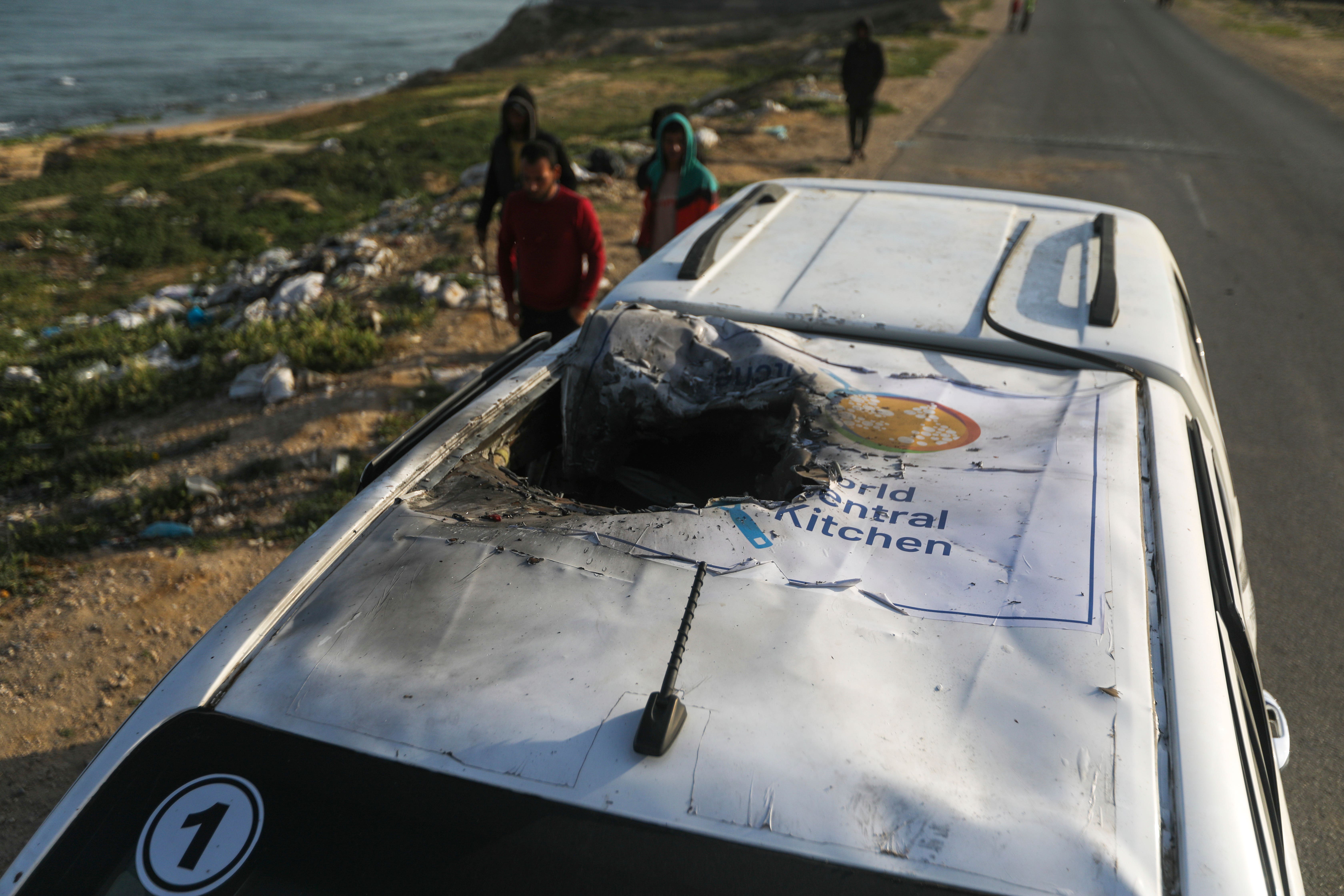PM faces calls to block arms exports to Israel after killing of aid workers
John Chapman, James Kirby and Jim Henderson died in an Israeli airstrike on Monday.

Your support helps us to tell the story
From reproductive rights to climate change to Big Tech, The Independent is on the ground when the story is developing. Whether it's investigating the financials of Elon Musk's pro-Trump PAC or producing our latest documentary, 'The A Word', which shines a light on the American women fighting for reproductive rights, we know how important it is to parse out the facts from the messaging.
At such a critical moment in US history, we need reporters on the ground. Your donation allows us to keep sending journalists to speak to both sides of the story.
The Independent is trusted by Americans across the entire political spectrum. And unlike many other quality news outlets, we choose not to lock Americans out of our reporting and analysis with paywalls. We believe quality journalism should be available to everyone, paid for by those who can afford it.
Your support makes all the difference.The Government is facing growing calls to suspend arms exports to Israel following the deaths of three British aid workers in an air strike in Gaza.
John Chapman, James Kirby and Jim Henderson were among seven World Central Kitchen (WCK) aid workers killed in strikes by the Israel Defence Forces on Monday.
Their deaths have prompted condemnation from the UK and its allies, while opposition politicians have called for the Government to block arms sales to Tel Aviv.
Labour’s shadow foreign secretary, David Lammy, said the Government should publish any legal advice it has regarding whether Israel had breached international law and suspend arms sales if there was a risk weapons could be used in “a serious breach of international humanitarian law”.
He said: “The law is clear. British arms licences cannot be granted if there is a clear risk that the items might be used to commit or facilitate a serious violation of international humanitarian law.
“Labour’s message to the Government is equally clear. Publish the legal advice now. If it says there is a clear risk that UK arms might be used in a serious breach of international humanitarian law, it’s time to suspend the sale of those arms.”
On Tuesday, Downing Street declined to say whether it believed Israel was operating within international humanitarian law, saying it would not comment on legal advice but adding ministers acted in accordance with any advice.
Both the Liberal Democrats and the SNP have also called for arms exports to be blocked.
Humza Yousaf, the Scottish First Minister and leader of the SNP, said the UK risked being “complicit in the killing of innocent civilians” if it continued arms to Israel, while Lib Dem leader Sir Ed Davey said suspending arms sales would “send a powerful signal from a close ally of Israel that we think this is unacceptable”.
The SNP and Plaid Cymru have also said Parliament should be recalled in order to debate the situation in Gaza.
SNP Westminster leader Stephen Flynn said: “This situation demands that the Prime Minister comes to Parliament without further delay to outline the UK Government’s response to the killing of UK citizens by Israel, to enable MPs to scrutinise the UK Government’s response, and so that Parliament can finally debate and vote on ending arms sales to Israel.”
The Government does not directly supply Israel with weapons, but does grant export licences for British companies to sell arms to the country and can block those sales by suspending the licences.
The UK has taken this course twice before. Margaret Thatcher’s government suspended arms exports following Israel’s 1982 invasion of Lebanon, while Tony Blair’s government blocked sales of some military equipment in 2002.
But Rishi Sunak has so far resisted calls to end arms sales to Israel.
Speaking to The Sun Newspaper’s Never Mind the Ballots show, Mr Sunak said: “I think we’ve always had a very careful export licensing regime that we adhere to.
“There are a set of rules, regulations and procedures that we’ll always follow, and I have been consistently clear with Prime Minister Netanyahu since the start of this conflict that while, of course, we defend Israel’s right to defend itself and its people against attacks from Hamas, they have to do that in accordance with international humanitarian law, protect civilian lives and, sadly, too many civilians have already lost their lives.
“Get more aid into Gaza. That’s what we’ve consistently called for and what we want to see actually is an immediate humanitarian pause to allow more aid in and, crucially, the hostages to be released, and that’s what we’ll continue to push for.”
Lord Peter Ricketts, a former senior diplomat who chaired the Joint Intelligence Committee during the Blair government, had earlier said Israeli forces’ killing of the aid workers has sparked “global outrage” as he called for an “immediate ceasefire”.
The crossbench peer, who served as national security adviser to the now-Foreign Secretary David Cameron, told BBC Radio 4’s Today programme: “I think there is abundant evidence now that Israel hasn’t been taking enough care to fulfil its obligations on the safety of civilians, and a country that gets arms from the UK has to comply with international humanitarian law, that is a condition of the arms export licensing policy.
“I think the time has come to send that signal.”
The United States remains by far the largest supplier of weapons to Israel, with Foreign Office minister Andrew Mitchell telling MPs before the Easter recess that UK exports accounted for just 0.02% of Israel’s military imports.